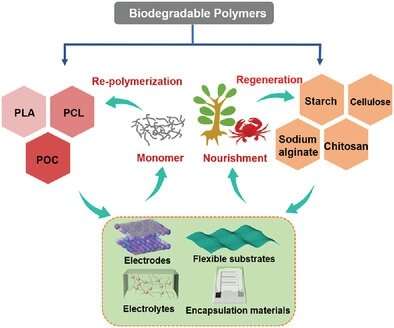This article has been reviewed according to Science X's editorial process and policies. Editors have highlighted the following attributes while ensuring the content's credibility:
fact-checked
peer-reviewed publication
trusted source
proofread
Biodegradable polymers show promise for future green supercapacitors

Polymers with their rich diversity, outstanding flexibility, and good processability can effectively enhance the functionality of supercapacitors and expand their practical applications. Currently, polymer materials used in supercapacitors are non-biodegradable, posing threats to the environment.
Recently, a research team led by Prof. Wu Zhongshuai from the Dalian Institute of Chemical Physics (DICP) of the Chinese Academy of Sciences (CAS) clarified the importance of biodegradable polymers, a component of future green supercapacitors.
Their review article was published in Advanced Functional Materials on Feb. 8.
"A green supercapacitor requires good biodegradability of different components to achieve harmless disposal in various environments," said Prof. Wu. "To meet these requirements, the device preparation must be highly dependent on the application of biodegradable polymers and innovative design strategies."
The researchers summarized the classification of existing biodegradable polymers and their typical structure, properties and preparation processes, as well as the main applications of biodegradable polymers in different components of supercapacitors, including electrodes, electrolytes, substrate and encapsulation materials.
They also discussed the research progress of biodegradable polymer-based supercapacitors in terms of preparation strategies and modification methods, as well as the key role of biodegradable polymers in the development process of green supercapacitors.
Moreover, they briefly proposed the future perspectives and challenges faced by biodegradable polymer-based supercapacitors.
"Biodegradable polymers are the ideal raw material, and suitable research strategies and preparation methods are powerful means to realize environment-friendly treatment of supercapacitors," said Prof. Wu.
More information: Lu Wu et al, Recent Advancements and Perspectives of Biodegradable Polymers for Supercapacitors, Advanced Functional Materials (2023). DOI: 10.1002/adfm.202211454
Journal information: Advanced Functional Materials
Provided by Chinese Academy of Sciences





















